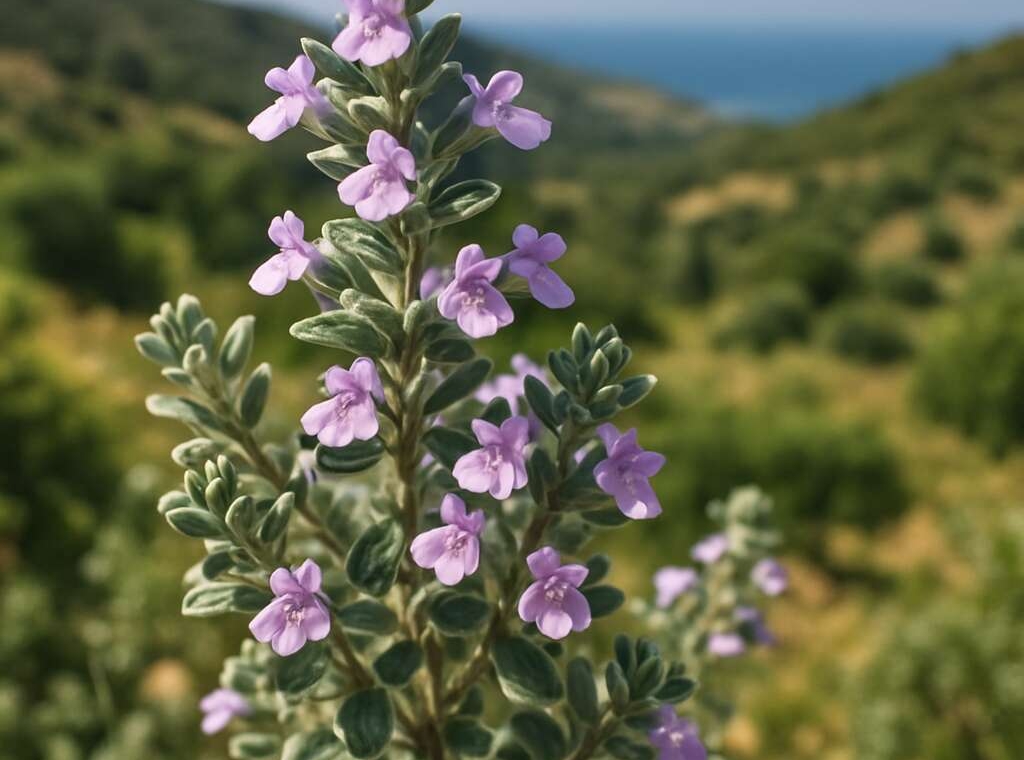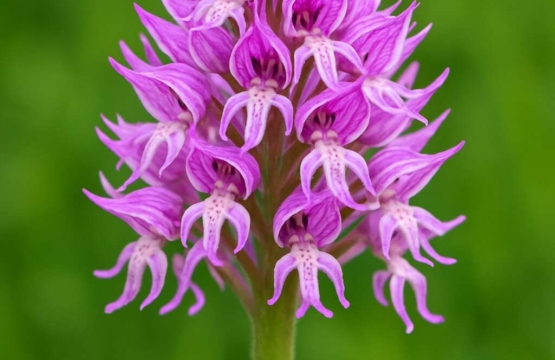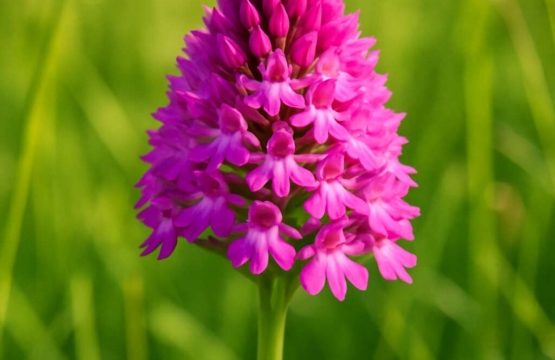Understanding Cyprus Basil Thyme (Acinos exiguus): An Endemic Species
Taxonomy and Classification – Detailed overview of the botanical classification of Acinos exiguus
In the intricate tapestry of Cyprus’s flora, few threads shimmer as uniquely as the Cyprus Basil Thyme (endemic) Acinos exiguus. This diminutive yet resilient herb embodies the rugged elegance of the island’s mountainous landscapes, capturing the essence of endemic beauty with each delicate leaf. Its botanical classification reveals a fascinating lineage, nestled within the Lamiaceae family, renowned for aromatic herbs that have long flavored both cuisine and tradition.
Acinos exiguus holds a distinguished place in taxonomy, distinguished by its small stature and distinct floral morphology. It belongs to the genus Acinos, characterized by aromatic, herbaceous plants that thrive in rocky, sun-drenched terrains. The classification hierarchy is as follows:
- Kingdom: Plantae
- Family: Lamiaceae
- Genus: Acinos
- Species: Acinos exiguus
This precise categorization underscores its role as a botanical treasure, endemic to Cyprus, and highlights its evolutionary connection to other aromatic herbs native to the Mediterranean. The Cyprus Basil Thyme (endemic) Acinos exiguus is not merely a plant but a living testament to the island’s rich biodiversity and unique ecological heritage, standing resilient against the sands of time and the shifting seasons.
Endemic Status and Geographic Range – Discussion of its limited distribution and endemic nature to Cyprus
In the lush, sun-drenched landscapes of Cyprus, a botanical marvel quietly asserts its endemic dominance—Cyprus Basil Thyme (endemic) Acinos exiguus. This diminutive herb, fiercely loyal to its native terrain, exemplifies the island’s remarkable biodiversity. Its geographic range is so limited that it could be mistaken for a well-kept secret—one that nature herself guards jealously.
Endemic to Cyprus, the Cyprus Basil Thyme (endemic) Acinos exiguus is found exclusively in specific mountainous regions, thriving amidst rocky outcrops and sun-baked slopes. Its restricted distribution makes it a rare gem, often overlooked but utterly vital to the island’s ecological tapestry. The plant’s survival is intricately woven into the Cyprus landscape, making it a living testament to the island’s evolutionary uniqueness.
To better appreciate its rarity, consider this: the entire population of Cyprus Basil Thyme (endemic) Acinos exiguus resides within a confined geographic corridor. This limited range not only underscores its endemic status but also elevates its importance in conservation efforts. Its existence echoes the delicate balance of Cyprus’s endemic flora, reminding us that some treasures are best appreciated in their natural habitat—intact and untouched.
Distinctive Features and Morphology – Physical characteristics that differentiate Cyprus Basil Thyme from similar species
Cyprus Basil Thyme (endemic) Acinos exiguus is a botanical marvel distinguished not just by its rarity, but by its captivating physical features. This diminutive herb, often overlooked, possesses a charm that’s subtle yet undeniably unique. Its compact stature—standing no taller than a few centimeters—belies the resilience embedded in its delicate form.
The plant’s leaves are small, narrow, and aromatic, with a slightly serrated edge that hints at its thyme-like qualities. These leaves cluster tightly along thin, woody stems, which give the herb a bushy, almost tangled appearance. When in bloom, Cyprus Basil Thyme (endemic) Acinos exiguus reveals tiny, tubular flowers—typically pale violet or lavender—that seem to glow against the rocky terrain of its native habitat.
What truly sets Cyprus Basil Thyme apart from similar species is its distinctive morphology. The arrangement of its flowers and the fine texture of its leaves are telltale signs of its endemic nature. To better understand, consider these features:
- Small, aromatic leaves with serrated edges
- Prolific, tiny tubular flowers in pale violet hues
- Compact, low-growing habit suited to rocky slopes
These characteristics not only distinguish Cyprus Basil Thyme (endemic) Acinos exiguus from other thyme relatives but also serve as a testament to its adaptation to Cyprus’s rugged landscape. Its physical form embodies a delicate balance—fragile yet resilient—making it a true emblem of the island’s unique biodiversity. Each detail, from the leaf’s texture to the flower’s subtle hue, offers a glimpse into the evolutionary artistry of this endemic treasure.
Habitat and Growing Conditions of Acinos exiguus
Natural Habitat in Cyprus – Description of the specific environments where the plant thrives
Cyprus Basil Thyme (endemic) Acinos exiguus finds its sanctuary amidst the rugged contours and sun-drenched cliffs of Cyprus, where the landscape whispers tales of ancient resilience. This delicate herb flourishes in environments that seem almost carved by time—rocky slopes, limestone outcrops, and sparse, well-drained soils that challenge all but the most adapted flora. Its preferred habitat is characterized by a Mediterranean climate, where hot, dry summers give way to mild, moist winters, creating a unique ecological niche that fosters its growth.
Thriving in these arid terrains, Acinos exiguus benefits from the limestone’s mineral richness and the sporadic presence of native shrubs that provide partial shade, shielding it from the relentless Cypriot sun. The plant’s natural habitat can be succinctly described through these key features:
- Sunlit, rocky slopes with excellent drainage
- Sparse vegetation and exposed terrain
- Alkaline, limestone-rich soils
Such conditions promote the resilience and subtle beauty of Cyprus Basil Thyme (endemic), making it a captivating subject for botanists and enthusiasts alike who seek to understand the delicate balance of Cyprus’s endemic flora.
Soil and Climate Preferences – Preferred soil types, altitude, and climate conditions for optimal growth
Cyprus Basil Thyme (endemic) Acinos exiguus has carved out a resilient niche within the rugged landscapes of Cyprus, thriving where few others dare to grow. Its optimal growth occurs in well-drained, rocky soils that are rich in limestone, offering the alkaline conditions it favors. This herb’s delicate stature is a testament to its adaptation to the Mediterranean climate—scorching, sun-drenched summers contrasted by mild, moist winters. The plant’s preference for higher altitudes, typically between 200 to 600 meters above sea level, allows it to escape the harshest summer heat while still benefiting from the mineral-rich terrain.
When considering the soil and climate preferences of Cyprus Basil Thyme (endemic) Acinos exiguus, it’s essential to note its affinity for sunlit, exposed slopes. The plant benefits immensely from the sporadic shade provided by native shrubs, which shield it from the relentless Cypriot sun without compromising its need for direct sunlight. Its survival hinges on these specific conditions, with the limestone-rich, alkaline soils acting as a vital foundation for its delicate roots. Such environments—characterized by sparse vegetation and excellent drainage—are not just preferred but essential for the plant’s flourishing. The unique ecological niche occupied by Acinos exiguus underscores its status as a true endemic marvel of Cyprus’s natural heritage.
Ecological Role and Interactions – Role within the local ecosystem and interactions with fauna and flora
Within Cyprus’s rugged terrain, Cyprus Basil Thyme (endemic) Acinos exiguus plays a subtle yet vital role in maintaining ecological balance. Its presence signals a resilient adaptation to a landscape marked by rocky limestone slopes and Mediterranean sun. This herb’s habitat is not merely a backdrop but a dynamic environment teeming with interactions that sustain the local ecosystem. It often coexists with native shrubs and other endemic plants, forming a complex web of survival strategies.
As a key player, Acinos exiguus attracts specific fauna, including pollinators like native bees and butterflies, which are essential for its reproduction. Its aromatic leaves also serve as a natural deterrent to certain herbivores, subtly shaping the plant community around it. The plant’s ability to thrive in well-drained, alkaline soils at higher altitudes ensures it remains a steadfast component of Cyprus’s endemic flora. Its ecological role extends beyond mere survival—this herb embodies the resilience and delicate balance of Cyprus’s natural heritage.
Cultivation and Conservation of Cyprus Basil Thyme
Cultivation Tips for Enthusiasts – Guidelines for growing Acinos exiguus in gardens or botanical collections
Growing Cyprus Basil Thyme (endemic) Acinos exiguus is an endeavor infused with both challenge and reward, capturing the essence of Cyprus’s unique botanical heritage. Enthusiasts who wish to cultivate this rare gem must replicate its native environment, emphasizing well-drained, rocky soils that mirror its natural habitat in Cyprus. The plant flourishes in Mediterranean climates—warm, sunny, and with minimal water—so providing similar conditions ensures its vitality and longevity.
For those eager to nurture this endemic species, attention to soil composition and microclimate is paramount. Ensuring proper drainage prevents root rot, while a modest application of organic matter can encourage healthy growth.
- Choose a sunny spot with protection from harsh winds
- Avoid overly moist or clay-heavy soils
- Maintain moderate watering—allowing soil to dry between applications
The cultivation of Cyprus Basil Thyme (endemic) Acinos exiguus in gardens or collections not only preserves its genetic lineage but also celebrates the resilience of Cyprus’s endemic flora. Its delicate yet resilient stature stands as a testament to nature’s artistry, deserving of both admiration and conservation.”
Threats and Conservation Challenges – Discussion of threats such as habitat loss, overharvesting, and climate change
The delicate beauty of Cyprus Basil Thyme (endemic) Acinos exiguus is increasingly under threat as the landscape it calls home faces relentless pressures. Habitat loss, driven by expanding agriculture, urban development, and tourism, chips away at the ancient rocky enclaves where this rare botanical treasure thrives. Overharvesting, often driven by the plant’s aromatic allure, further endangers its fragile populations, risking the loss of a species that has silently persisted for centuries.
Climate change adds yet another layer of peril, subtly altering the Mediterranean microclimates that sustain Acinos exiguus. Rising temperatures and irregular rainfall patterns threaten its ability to flourish in the wild, pushing it further toward the brink of extinction. To safeguard this endemic species, conservation efforts must prioritize habitat protection and sustainable harvesting practices. Recognizing the importance of its ecological role, efforts are underway to monitor and preserve this emblem of Cyprus’s unique flora, ensuring that future generations can marvel at the resilience and beauty of Cyprus Basil Thyme (endemic) Acinos exiguus.
Conservation Efforts and Protected Areas – Information about ongoing conservation programs and protected regions in Cyprus
Amidst the rugged, sun-drenched landscapes of Cyprus, a fragile emblem of botanical resilience persists—Cyprus Basil Thyme (endemic) Acinos exiguus. Its rarity underscores the urgent need for targeted conservation initiatives that safeguard not only a single species but the intricate web of life it supports. Currently, several ongoing conservation programs focus on habitat restoration and ecological monitoring, aiming to halt the creeping tide of habitat destruction that threatens this endemic species.
Protected areas such as the Akamas Peninsula and the Troodos Mountains serve as vital sanctuaries for Acinos exiguus, where strict regulations help curb overharvesting and habitat encroachment. These regions are meticulously monitored by conservation organizations committed to maintaining Cyprus Basil Thyme (endemic) Acinos exiguus’s natural environment. Preservation efforts extend beyond mere protection, emphasizing sustainable practices that allow the species to thrive without human interference turning destructive.
In the broader scope of ecological stewardship, collaborative initiatives involve local communities, botanists, and policymakers, weaving a tapestry of resilience around this tiny yet significant botanical treasure. As a symbol of Cyprus’s unique flora, the ongoing efforts reflect a collective dedication to ensuring that Cyprus Basil Thyme (endemic) Acinos exiguus remains a living testament to the island’s natural heritage. It’s not just about conservation—it’s about nurturing the very essence of Cyprus’s botanical identity for generations to come.
Uses and Significance of Acinos exiguus
Medicinal and Aromatic Uses – Traditional and modern applications, essential oil potential, and safety considerations
In the realm of Cyprus’s endemic flora, Acinos exiguus, affectionately known as Cyprus Basil Thyme, is a fragrant whisper of the island’s ancient landscape. Its aromatic leaves have long been treasured for both traditional and modern uses, embodying a unique synergy of medicinal and aromatic qualities. Historically, local communities harnessed the plant’s potent essence to soothe digestive ailments and invigorate the senses, while contemporary herbalists explore its essential oil potential, unlocking a new chapter in natural remedies.
Its essential oil, rich in delicate, fragrant compounds, offers promising applications in aromatherapy and natural skincare, capturing the very essence of Cyprus’s sun-drenched hills. However, safety considerations are paramount—excessive use or unregulated extraction may lead to skin sensitivities or adverse reactions. As this endemic treasure faces threats from habitat loss and climate change, understanding its uses and significance becomes vital. Cyprus Basil Thyme (endemic) Acinos exiguus remains a botanical jewel, a fragrant testament to the island’s ecological heritage and a promising candidate for sustainable exploitation in the future.
Cultural and Symbolic Importance – Its role in Cypriot culture and local traditions
Within the rich tapestry of Cypriot culture, Cyprus Basil Thyme (endemic) Acinos exiguus holds a cherished place. For generations, local communities have regarded this aromatic herb as a symbol of the island’s natural resilience and heritage. Its fragrant leaves are intertwined with traditional ceremonies, often used in rituals to invoke health and protection. In rural villages, families pass down stories where the plant’s essence is believed to carry the spirit of Cyprus itself—embodying the land’s enduring beauty and strength.
Beyond its practical uses, Cyprus Basil Thyme (endemic) Acinos exiguus bears deep symbolic significance. It is frequently featured in celebrations, woven into wreaths and offerings that honor both nature and ancestral roots. Its presence in local folklore underscores a profound respect for endemic species that define Cyprus’s ecological identity. This connection elevates the plant from mere flora to a living emblem of the island’s enduring cultural soul, reminding us of the delicate balance between tradition and conservation. Truly, this endemic herb is more than just a plant—it’s a testament to Cyprus’s enduring spirit and heritage.
Research and Scientific Interest – Recent studies on its phytochemistry and potential benefits
Recent phytochemical research on Cyprus Basil Thyme (endemic) Acinos exiguus reveals a treasure trove of bioactive compounds with promising health benefits. Scientists have identified a complex array of flavonoids, phenolic acids, and essential oils that contribute to its potent antioxidant properties. Such discoveries underscore the plant’s potential for developing natural remedies and aromatic products rooted in Cyprus’s unique biodiversity.
Beyond its traditional uses, modern studies explore the antimicrobial and anti-inflammatory effects of Acinos exiguus. Preliminary trials suggest that extracts from this endemic herb could serve as natural preservatives or therapeutic agents. Its essential oil, rich in thymol and carvacrol, not only imparts a distinctive aromatic profile but also hints at applications in aromatherapy and herbal medicine, making it a subject of increasing scientific curiosity.
Researchers are also investigating the plant’s potential in sustainable agriculture and phytopharmaceutical industries. The unique phytochemistry of Cyprus Basil Thyme (endemic) Acinos exiguus positions it as a candidate for natural bioactive compounds, fostering a deeper appreciation for Cyprus’s endemic flora. As conservation efforts grow, so does the scientific interest in unlocking the full potential of this remarkable herb, bridging tradition with innovation.
Botanical and Ecological Research on Cyprus Basil Thyme
Recent Discoveries and Studies – Summaries of recent research findings related to Acinos exiguus
Recent botanical and ecological research on Cyprus Basil Thyme (endemic) Acinos exiguus has unveiled a tapestry of secrets nestled within its rugged homeland. Scientists have uncovered that this diminutive herb, cloaked in mystery, exhibits remarkable resilience in the limestone-rich soils of Cyprus’s mountainous regions. These studies reveal a delicate balance between its limited distribution and the unique microclimates it endures, making it a vital indicator of ecological health in the island’s secluded corners.
Furthermore, cutting-edge phytochemical analyses have identified a suite of bioactive compounds within Acinos exiguus, hinting at untapped medicinal potential. Researchers are particularly intrigued by its aromatic profile, which could unlock new applications in aromatherapy and natural remedies. The ongoing investigations deepen our understanding of this endemic species, emphasizing its ecological significance and the urgent need to preserve its fragile habitat.
Genetic Diversity and Adaptation – Insights into its genetic variation and adaptation strategies
Within the rugged terrains of Cyprus, the endemic Cyprus Basil Thyme (endemic) Acinos exiguus reveals an extraordinary tapestry of genetic resilience. Recent botanical research underscores its remarkable ability to adapt to the island’s limestone-rich soils and microclimates, which are often harsh and unpredictable. This herb’s genetic diversity is a testament to its evolutionary strategy, allowing it to thrive in isolated pockets where few other species can persist.
Scientists have identified specific adaptation mechanisms in Acinos exiguus, such as variations in its aromatic compounds and morphological traits, enabling it to withstand temperature fluctuations and soil deficiencies. These genetic variations are not just survival tools but also indicators of the plant’s vital role within Cyprus’s fragile ecosystem.
Interestingly, the genetic makeup of Cyprus Basil Thyme (endemic) Acinos exiguus hints at a broader evolutionary narrative—one that emphasizes resilience and specificity. Its adaptation strategies serve as a natural blueprint for understanding how endemic species can survive amidst changing environmental conditions, making it a focal point for conservation and botanical study in Cyprus.
Future Research Directions – Potential areas for further scientific investigation
Future botanical research on Cyprus Basil Thyme (endemic) Acinos exiguus promises a treasure trove of scientific revelations. While much has been uncovered about its resilience and unique adaptations, several intriguing avenues remain largely unexplored. This endemic herb holds the potential to unlock secrets about plant survival in limestone-dominated terrains and microclimates, which are notoriously challenging environments for flora. Exploring its phytochemical profile further could unveil new aromatic compounds with medicinal or aromatic applications, elevating its status beyond a simple herb.
One promising direction is the in-depth study of its ecological interactions. Understanding how Acinos exiguus influences and is influenced by the surrounding flora and fauna could illuminate its role in sustaining Cyprus’s delicate ecosystems. Additionally, research into its reproductive biology and seed dispersal mechanisms may offer insights into its limited distribution yet robust genetic diversity.
Potential future investigations include:
- Assessing its response to climate change, particularly temperature shifts and drought stress.
- Investigating its genetic variation across different microhabitats to better inform conservation strategies.
- Developing sustainable cultivation techniques that could alleviate harvesting pressures from wild populations.
As scientists continue to peel back the layers of this captivating plant, Cyprus Basil Thyme (endemic) Acinos exiguus remains a quintessential symbol of the island’s botanical resilience—an enduring testament to nature’s ingenuity and a beacon for future ecological and phytochemical discoveries.
How to Recognize and Identify Acinos exiguus
Identification Tips – Key features to distinguish Cyprus Basil Thyme from similar species
Amidst the rugged terrains and sun-dappled slopes of Cyprus, the Cyprus Basil Thyme (endemic) Acinos exiguus emerges as a botanical marvel—its subtle yet distinctive features set it apart from related aromatic herbs. Recognizing this endemic species requires a keen eye for its unique morphology, especially given its resemblance to other thyme and basil relatives. The plant’s diminutive stature, often just a few centimeters tall, belies its intricate beauty.
One of the key identification tips for Acinos exiguus lies in its leaf structure. The leaves are small, ovate, and densely packed along the stems, with a slightly hairy surface that exudes a fragrant aroma when crushed—a hallmark of its aromatic profile. The flowers, delicate and pale lilac to purple, cluster tightly at the tips of the stems, creating a subtle yet unmistakable visual cue. To distinguish this endemic species from similar herbs, observe the plant’s growth habit: it tends to form low, mat-like patches that cling closely to rocky substrates.
While the overall appearance might evoke familiar basil or thyme, the Cyprus Basil Thyme’s specific features—such as its leaf texture, floral arrangement, and growth form—are precise indicators. Recognizing these subtle nuances ensures accurate identification, an essential step for those passionate about Cyprus’s native flora or engaged in conservation efforts.
Photographic Guide – Visual cues and images for proper identification
When seeking to recognize the elusive Cyprus Basil Thyme (endemic) Acinos exiguus, visual cues become your most reliable allies. This diminutive herb, often no taller than a few centimeters, exudes a subtle charm that demands careful observation. Its small, ovate leaves are densely packed and slightly hairy to the touch, releasing a fragrant aroma when gently crushed—an immediate indicator of its aromatic heritage. Photographs capturing these details reveal the plant’s delicate floral clusters, which appear as pale lilac to purple blooms, tightly nestled at the stem tips.
To distinguish Acinos exiguus from similar herbs, focus on its growth habit: low, sprawling mats that cling to rocky substrates. A photographic guide emphasizing these features—such as close-up shots of leaf texture, flower arrangement, and overall plant posture—can be invaluable. Remember, the plant’s subtle visual cues, combined with an understanding of its native environment, create a holistic picture for accurate identification. Recognizing these nuanced differences ensures that enthusiasts and conservationists alike can truly appreciate the unique beauty of the Cyprus Basil Thyme (endemic) Acinos exiguus.
Comparison with Related Species – Differences from other thyme and basil relatives
Recognizing Acinos exiguus, the elusive Cyprus Basil Thyme (endemic), requires an eye attuned to subtle botanical nuances. Unlike common thyme or basil relatives, this diminutive herb’s size is a defining feature—often no taller than a few centimeters—making it a true gem of Cyprus’s rocky landscapes. Its small, ovate leaves are densely packed along the stems, with a slightly hairy surface that releases a fragrant aroma when gently crushed, hinting at its aromatic heritage.
To differentiate Acinos exiguus from similar herbs, focus on its growth habit. It forms low, sprawling mats that cling to rocky substrates, creating a delicate tapestry across Cyprus’s rugged terrain. Here are some key features to keep in mind:
- Compact, low-growing stature
- Dense, ovate, slightly hairy leaves
- Pale lilac to purple floral clusters at stem tips
- Sprawling, mat-forming growth pattern
Compared to other thyme and basil relatives, Acinos exiguus’s unique combination of size, leaf texture, and floral arrangement sets it apart. Understanding these distinctions is essential for enthusiasts and botanists aiming to identify this rare endemic accurately, especially in the wild habitats where it thrives—rocky slopes and limestone crags across Cyprus. Its delicate appearance hides a resilient plant, perfectly adapted to its native environment, making proper identification a rewarding challenge for those exploring Cyprus’s endemic flora.





